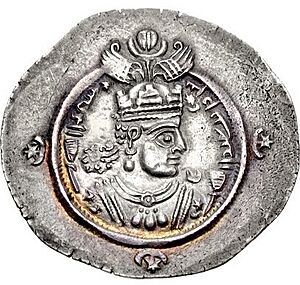Ardashir III facts for kids
Quick facts for kids Ardashir III𐭠𐭥𐭲𐧅𐭲𐭥 |
|
|---|---|
| King of Kings of Iran and non-Iran | |

Drachma of Ardashir III, minted at Arrajan in 629.
|
|
| Shahanshah of the Sasanian Empire | |
| Reign | 6 September 628 – 27 April 630 |
| Predecessor | Kavad II |
| Successor | Shahrbaraz |
| Born | 621 |
| Died | 27 April 630 (aged 9) Ctesiphon |
| Burial | Meshan |
| House | House of Sasan |
| Father | Kavad II |
| Mother | Anzoy |
| Religion | Zoroastrianism |
Ardashir III (Middle Persian: 𐭠𐭥𐭲𐧅𐭲𐭥, romanized: Ardašir; 621 – 27 April 630) was a very young king of the Sasanian Empire. This was a powerful kingdom in ancient Iran. He ruled as the King of Kings (also called shahanshah) from September 628 to April 630.
Contents
What's in a Name?
The name Ardashir comes from an old Persian word. It means "whose reign is through truth." It's a very old and important name. Three other famous kings from an even older Persian empire, the Achaemenid Empire, also had this name.
His Early Life
Ardashir was the son of King Kavad II. His mother, Anzoy, was a princess from the Byzantine Empire. This made some people in Iran dislike Ardashir. Iran had just finished a long and tough war against the Byzantines.
In 628, a terrible sickness spread across western Iran. It was a plague that killed many people. Ardashir's father, King Kavad II, also died from this plague.
Becoming King
After his father died, Ardashir was chosen to be the new king. He was only seven years old at the time. Because he was so young, he didn't really rule the empire himself. Instead, his chief minister, Mah-Adhur Gushnasp, was in charge. Mah-Adhur Gushnasp's job was to protect the empire until Ardashir was old enough to rule.
An old historian named al-Tabari wrote about Mah-Adhur Gushnasp. He said that the minister managed the kingdom so well that no one would have known Ardashir III was just a child.
Challenges During His Rule
Even with a strong minister, the Sasanian Empire faced many problems. Different powerful groups in Iran were fighting for control. These groups had become very strong during the time of Ardashir's grandfather, Khosrau II. They controlled important parts of Iran. The central government of the Sasanian Empire was not as strong as it used to be.
At first, Ardashir's rule was supported by two main groups: the Pahlav (Parthian) and Parsig (Persian) factions. A third group, the Nimruzi, also supported him. However, in 629, the Nimruzi group stopped supporting the young king. They started to plan with a famous general named Shahrbaraz to remove Ardashir from power.
The Pahlav group, led by Farrukh Hormizd, decided to support Ardashir's aunt, Boran, as the new ruler. Boran then started making coins in the areas controlled by the Pahlav group. These areas included Amol, Nishapur, Gurgan, and Ray.
The End of His Reign
About a year later, General Shahrbaraz marched with 6,000 soldiers towards Ctesiphon, the capital city. He tried to capture the city but couldn't at first. So, Shahrbaraz made a deal with Piruz Khosrow, the leader of the Parsig group. Piruz Khosrow had been a minister for Ardashir's father.
With the help of both the Parsig and Nimruzi groups, Shahrbaraz finally captured Ctesiphon. He then had Ardashir, his minister Mah-Adhur Gushnasp, and many other important nobles killed. After this, Shahrbaraz became the new king of Iran.
According to old stories, Ardashir was buried in a place called Meshan, but its exact location is unknown.
His Coins
Like his father, Ardashir III did not use the full title of shahanshah ("King of Kings") on his coins. This was probably done to show a difference from Khosrow II, who had brought back that title.
See also
 In Spanish: Ardacher III para niños
In Spanish: Ardacher III para niños
 | George Robert Carruthers |
 | Patricia Bath |
 | Jan Ernst Matzeliger |
 | Alexander Miles |

